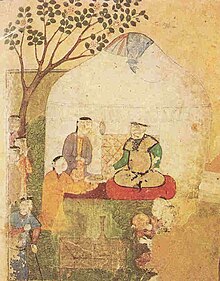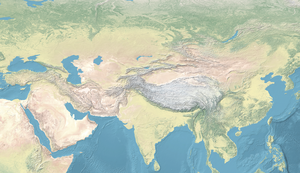
Back شيبانيون Arabic Şeybani xanlığı Azerbaijani Xibànides Catalan Shaibanide-dynastiet Danish Scheibaniden German Shaybánidas Spanish شیبانیان Persian Chaybanides French Sajbánidák Hungarian Shaybanidi Italian
| Shaybanids | |
|---|---|
The Shaybanids and main contemporary polities c. 1500 | |
 The trellis-walled yurt of Muhammad Shaybani Khan. | |
| Parent family | Borjigin |
| Country | Uzbek Khanate Khanate of Sibir Khanate of Bukhara |
| Current region | Southern Russia Middle Asia |
| Place of origin | Golden horde |
| Founded | c. 1428 |
| Founder | Abu'l-Khayr Khan |
| Final ruler | Pir Muhammad Khan |
| Titles | Khan |
| Traditions | Sunni Islam |
| Dissolution | c. 1599 |
The Shibanids or Shaybanids (Uzbek: Шайбонийлар, Shayboniylar[1], Persian: دودمان شیبانیان) or more accurately the Abu'l-Khayrid-Shibanids, were a dynasty of Turko-Mongol origin,[2] who ruled over most of modern-day Kazakhstan, much of Uzbekistan, and parts of southern Russia (including Siberia) in the 15th century.[3] They were the patrilineal descendants of Shiban, the fifth son of Jochi and grandson of Genghis Khan.[4] Until the mid-14th century, they acknowledged the authority of the descendants of Shiban's brothers Batu Khan and Orda Khan, such as Öz Beg Khan. The Shaybanids originally led the gray horde southeast of the Urals (also known as the Uzbegs, after the Uzbeks), and converted to Islam in 1282. At its height, the Khanate included parts of modern-day Afghanistan and other parts of Central Asia.
As the lineages of Batu and Orda died out in the course of the great civil wars of the 14th century, the Shaybanids under Abu'l-Khayr Khan declared themselves the only legitimate successors to Jochi and put forward claims to the whole of his enormous ulus, which included parts of Siberia and Kazakhstan. Their rivals were the Tukay-Timurid dynasty, which claimed descent from Jochi's thirteenth son by a concubine. Several decades of strife left the Tuqay-Timurids in control of the Great Horde and its successor states in Europe, namely the Khanates of Kazan, Astrakhan, and Crimea.
- ^ Shiban Han divani. Edited Y.Karasoy. Ankara, 1998
- ^ Kilic-Schubel 2016, p. 1.
- ^ McChesney 1986, p. 428.
- ^ Grousset 1970, p. 478.
© MMXXIII Rich X Search. We shall prevail. All rights reserved. Rich X Search

